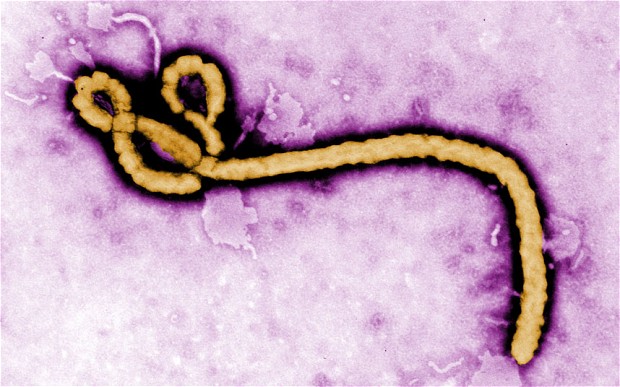Two deaths in remote region of Democratic Republic of Congo confirmed as Ebola but “unrelated” to west Afica epidemic…report by The Telegraph
The Democratic Republic of Congo confirmed its two first cases of Ebola this year, but claimed they were unrelated to the epidemic raging in four countries of West Africa.
Congolese health minister Felix Kabange Numbi said that two of eight samples taken from victims of a mystery fever had tested positive for Ebola.
“The results are positive. The Ebola virus is confirmed in DRC,” Mr Kabange told AFP.
Speaking later on public television, he said the confirmation marked the seventh outbreak of Ebola in DR Congo, where the virus was first identified in 1976 near the Ebola River.
But he said the two new cases had “no link to [the epidemic] raging in West Africa” and were different strains from one another.
Authorities immediately imposed a quarantine around the affected area in Equateur province near Jera, more than 750 miles northeast of the Congolese capital Kinshasa.
Medical aid group Medecins Sans Frontieres said it was sending a crew to help handle patients in the area.
The UN’s World Health Organization (WHO) meanwhile announced that one of its health experts, an epidemiologist, had been infected while working in Sierra Leone.
The WHO gave no details of its infected expert, but said the person was “receiving the best care possible” and that it was considering a medical evacuation.
Also on Sunday, Britain’s first Ebola patient, a male nurse who contracted the disease in Sierra Leone, was admitted to a London hospital.
He arrived yesterday at Britain’s only specialist Ebola isolation unit at the Royal Free Hospital in London.
The patient, who is not “seriously unwell” according to the Department of Health, was evacuated in a specially equipped C17 Royal Air Force military plane before being taken by military ambulance across London flanked by a police escort.
The sobering news of Ebola’s spread came as UN officials pledged to step up efforts against the lethal tropical virus, which has infected more than 2,600 and killed 1,427, according to WHO figures released Friday.
Sierra Leone, where 392 Ebola deaths have been recorded, is one of four West African states struggling to control the spread of the aggressively contagious virus, which can spread through bodily fluids including saliva and blood.
Liberia has been particularly hard hit since the outbreak began in March, with 624 deaths, compared with 406 for Guinea and five for Nigeria, according to a WHO count on Friday.
On Saturday the UN Secretary-General Ban Ki-moon’s special representative for Liberia, Karin Landgren, pledged the world body would take a “strong role” in coordinating the response to the emergency.
But the WHO has warned that it could take “several months” to bring the epidemic under control, and estimates its count of the infected and dead is likely far too low, due in part to community resistance to outside medical staff and a lack of access to infected areas.
The epidemic, which first erupted in the forests in the south of Guinea, is also taking its toll on the economies of some of the world’s poorest countries.
“It is a total catastrophe. We are losing lots of money,” Alhaji Bamogo, who sells clothes in the market in the Liberian capital Monrovia, told AFP recently.
“All those who are coming to the market come only to buy food or products for the disinfection of Ebola,” he said.
Several international airlines have halted flights to the region in a move that Moody’s ratings agency warns “will exact an economic toll”.
Steel giant ArcelorMittal said contractors at its iron ore works in Liberia had suspended operations and were pulling out staff.
And in quarantined areas in Sierra Leone and Liberia, cash crops like cocoa and coffee are being left to rot as farmers fear to stray from home.
On Sunday, Benin postponed a meeting of African health ministers scheduled for early September.
Meanwhile the Ivory Coast has closed its borders with Guinea and Liberia, just days after Senegal did the same with Guinea.
And South Africa has banned entry for non-citizens arriving from Sierra Leone, Guinea and Liberia.
The measures taken against Ebola-afflicted countries, especially by neighbours, have caused friction in the region.
Ibrahim Ben Kargbo, the chairman of Sierra Leone’s presidential task force on Ebola, said he was “surprised” by the lack of solidarity among African countries.
It “gives the impression that we are pariah states,” Kargo said on state television.
Original Post by The Telegraph



